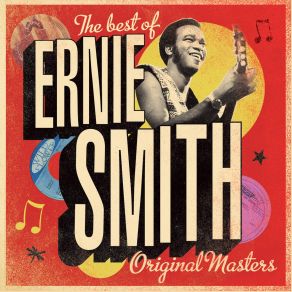The Best of Ernie Smith - Original Masters
Download links and information about The Best of Ernie Smith - Original Masters by Ernie Smith. This album was released in 2010 and it belongs to Rock, Reggae genres. It contains 17 tracks with total duration of 56:15 minutes.

|
|
|---|---|
| Artist: | Ernie Smith |
| Release date: | 2010 |
| Genre: | Rock, Reggae |
| Tracks: | 17 |
| Duration: | 56:15 |
| Buy it NOW at: | |
| Buy on iTunes $9.99 | |
| Buy on iTunes $11.99 | |
Tracks
[Edit]| No. | Title | Length |
|---|---|---|
| 1. | I Can't Take It | 2:30 |
| 2. | Bend Down | 2:31 |
| 3. | Girl (Tell Me What To Do) | 3:41 |
| 4. | One Dream | 2:42 |
| 5. | Ride On Sammy | 3:08 |
| 6. | Pitta Patta | 3:08 |
| 7. | I Love You To Want Me | 2:41 |
| 8. | Love Song | 3:21 |
| 9. | You Poured Sugar On Me | 3:01 |
| 10. | Life Is Just For Living | 2:44 |
| 11. | Sunday Morning Coming Down | 4:31 |
| 12. | Duppy Gun Man | 3:20 |
| 13. | Key Card | 3:07 |
| 14. | And As We Fight One Another/ Fe De Power and the Glory | 6:21 |
| 15. | Nice Time | 2:40 |
| 16. | Footprints On the Ceiling | 3:41 |
| 17. | All For Jesus | 3:08 |
Details
[Edit]There really isn’t anyone quite like Ernie Smith in the whole history of Jamaican pop music. A subtle and unassuming songwriter, his songs are more Merle Haggard than Bob Marley (although he has done some fine covers of Marley tunes), and with his everyman baritone voice, he made each of his tracks sound honest and sincere, and in Smith's case, having a limited vocal range is part of why his songs work — they’re simple and unadorned without being throwaway trifles, a bit like hearing one’s neighbor sing a Lou Rawls song with conviction on the back porch. At his best, Smith created a kind of country reggae with Jamaican honky tonk ballads like “I Can’t Take It” (later covered by Johnny Nash as “Tears on My Pillow”), “Bend Down,” and his wonderful version of Kris Kristofferson's “Sunday Morning Coming Down,” while Smith's renditions of Marley's “Nice Time” and “You Poured Sugar on Me” have a sturdy, patient, and good-natured vibe about them, all attributes that Marley no doubt appreciated in these versions. All of these tracks are here in this no-frills set that surveys Smith's time with Jamaica’s Federal Records in the 1960s and 1970s. It adds up to a great portrait of one of Jamaica’s best-kept secrets.